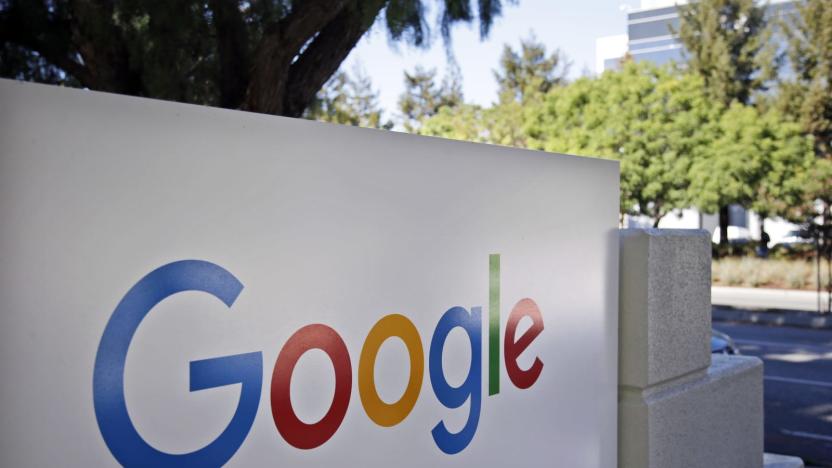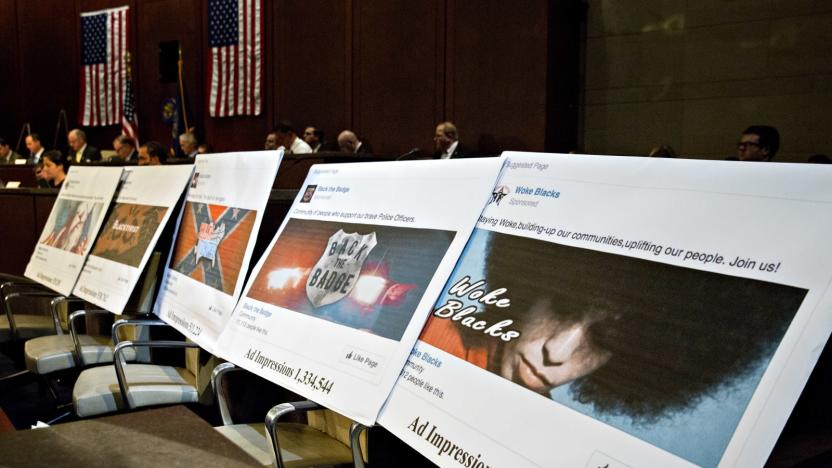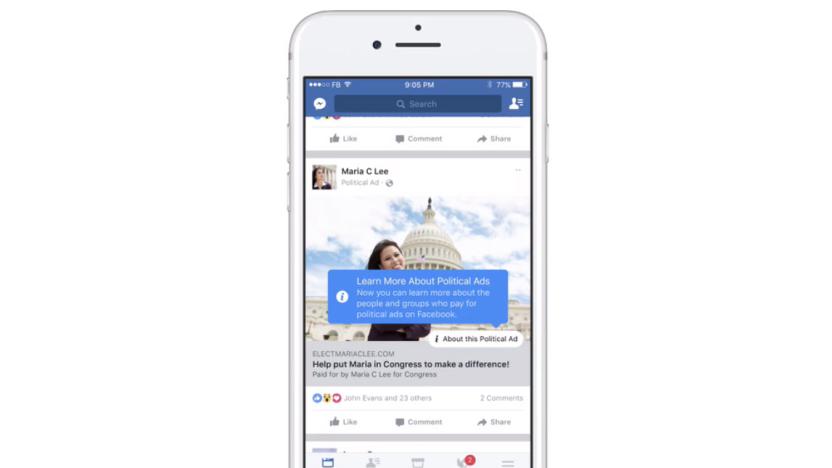political
Latest

Facebook plans to clarify when pro-Bloomberg posts come from staffers
Thanks to Mike Bloomberg, Facebook wants to make it more obvious when paid campaign staffers share posts promoting candidates, CNBC reports. This is a direct response to Bloomberg paying organizers to post on social media, but it could apply to any campaign staffers sharing political views on Facebook.

NLRB tells Google to remind workers they can speak freely (updated)
Google has agreed to a proposed settlement with the National Labor Relations Board to remind employees they can freely discuss workplace issues, which follows a directive from the company ordering Googlers to "avoid controversies that are disruptive to the workplace." The NLRB was responding to formal complaints claiming Google punishes people who speak out on those matters and political issues, according to the Wall Street Journal.

Google's internal community guidelines discourage political discussions
Today, Google released a new set of community guidelines that bans political discussions inside the company and reminds Googlers that they are responsible for their words and will be held accountable for them. The policy change appears to be an attempt to avoid the controversies that have sprung up amongst employees, but it could be seen as a way to curb employee outcry over Google's policies.

Facebook, Twitter and social media’s road to federal regulation
The extent of Russia's meddling in the 2016 US presidential election remains unclear, but it's no secret that social media played a major role. This year brought with it a great deal of scrutiny for tech giants, particularly Facebook, Twitter and Google. These three companies came under the US government's microscope after news that Kremlin bots and trolls, spearheaded by a group known as the Internet Research Agency, used their sites to tamper with the 2016 presidential election. They spread misinformation (fake news!) and dubious ads across Facebook, Twitter and Google to hundreds of millions of users in the US, with the aim of fomenting hostility among Americans. And it's safe to say they succeeded.

Facebook will require political advertisers to disclose their identities
Facebook has had a rough few months since the election. At least 10 million people saw Russian-placed political ads on the platform, which may have helped widen the rift between political sides during the 2016 US presidential election. In reaction, the social network has pledged to hand-review any new ads that target politics and race. Further, Facebook has just announced that it will be rolling out new transparency features for all ads, including political ones, starting next month in Canada. The US will get the new tools by next summer, in time for the US midterm elections next November.

Facebook is the latest coup victim in Thailand, where the selfie reigns supreme
Foreign governments have been blocking Twitter and Facebook off and on for years, and now Thailand's responsible for some social service downtime. The country's Information Communications Technology (ICT) Ministry disabled access at the military's request, taking the site offline for about 30 minutes yesterday afternoon. According to a Reuters report, Surachai Srisaracam, an ICT official, said the action was intended to "thwart the spread of online criticism of the military" following the recent coup. The official added that the government planned to meet with other social sites, such as Instagram and Twitter, "to ask for cooperation from them." Meanwhile, many Thai citizens are using sharing sites for more innocuous purposes, such as posting selfies with soldiers, which they are once again free to do. Update, May 30th: That meeting between social networks and the Thai military? Guess what. No one showed up. [Image credit: Bloomberg via Getty Images]

EVE Evolved: Top ten ganks, scams, heists and events
It's been called "boring," "confusing," and "the world's biggest spreadsheet," but every now and then a story emerges from sci-fi MMO EVE Online and grabs the gaming world's attention. Tales of massive thefts, colossal battles, high-value kills, record-breaking scams, political dirty deals, and controversial player-run events never fail to grip us. Perhaps it's the fact that these events have such huge impacts in the EVE sandbox that captures our imaginations, or maybe we just want to watch with morbid curiosity as a virtual society self-destructs. Whether it's innocent interest in quirky stories or a secret sense of schadenfreude that keeps us glued to EVE's most illicit events, the game continues to deliver them with startling regularity. Most scams, thefts, and high-profile battles will never make the news, instead becoming another forgotten part of EVE's history or just a story for a few friends to reminisce about. But those stories that do reach the news always draw in a huge audience that wouldn't play EVE in a million years but can't get enough of its engrossing stories. In this week's EVE Evolved, I run down a list of ten incredible EVE kills, scams, heists, and sandbox events that have made it into the news over the years.

Both US presidential candidates pushing iPhone apps
It's an election year, iOS devices are almost everywhere, and that's why both US Presidential candidates this year are already pushing iPhone apps. Governor Mitt Romney, the presumptive Republican nominee, has released an app called Mitt's VP -- he plans to announce his choice for Vice President from that app first, and there's other sharing and notification features coming in the app as well. President Barack Obama has made a lot of waves for using digital media in his campaigns, and so of course there's an official Obama for America app. That app also shares news and allows for social sharing about the Obama campaign, and allows users to sign up to volunteer at campaign events, or help get out the vote in other ways. Apple's platform consists of a huge audience of well-connected people, so it's no surprise that the presidential election is reflected in the App Store. As we get closer and closer to November's election here in America, it'll be interesting to see how the candidates use these apps to reach out to their voter base. #next_pages_container { width: 5px; hight: 5px; position: absolute; top: -100px; left: -100px; z-index: 2147483647 !important; }

Storyboard: The social contract
Have you ever thought about the fact that every single one of your characters is a murdering thief? Picture the scene for a moment: You have a group of people living in an isolated and rural community. Without warning, a man with heavy weaponry bursts in and starts hacking his way through every inhabitant of the community, smashing his way into locked houses. But he also stops at the body of each victim to gather any money or important belongings, slowly working his way through the community until there's nothing left but carrion and a few trinkets he didn't deem valuable enough to steal. On the news, this would be up there as a pretty shocking tragedy. In an MMO, this is a good chunk of the gameplay. And that brings to mind one of the major issues that faced by roleplayers hoping for verisimilitude: the horrible discrepancies between the social contract as we understand it and the one employed by the characters in the game. They're divergent sometimes, identical at other times, and universally ambiguous.

Occupy the Joystick: OAK-U-TRON 201X and Keep Me Occupied take DIY games to the people
In a spot usually reserved for household names like Street Fighter or Galaga, the cabinet's title reads OAK-U-TRON 201X, hastily printed on computer paper. Heavy with the hardware and battery required to make it operate on the move, the OAK-U-TRON's creators Alex Kerfoot and Mars Jokela were sweating with the effort of pushing it through a park in the middle of San Francisco. Like a DIY Trojan horse, it contains a collection of indie titles specifically written for the Winnitron software system, all housed in a piecemeal arcade cabinet complete with an old computer monitor and PS2 fight stick controllers.I had spotted them while eating lunch in a park in the heart of downtown San Francisco, and made the decision to throw away my mediocre turkey sandwich in order to jog over and check it out. As we walked along, folks from everywhere in the park had the same idea I did, and examined the moving cabinet. Of course, that's exactly what Kerfoot and Jokela were hoping for.

The Daily Grind: How political should game companies be?
So, who here has heard about this SOPA thing? PIPA? Anyone? I would venture a guess that most of you out there have not only heard about it, but you're violently opposed to it, as are Massively, Joystiq, and our parent company AOL. To think we're not is silly because the internet is our livelihood. But politics and videos games don't usually mix, so this is new ground for us. When you read about game companies boycotting SOPA/PIPA, the reaction is mixed among players. Some respect the fact that these companies are rising up against this piece of legislation while others think these studios should just concentrate on making (or fixing) their games. But the entertainment industry is far from a stranger to politics. From Neil Young to Dave Mustaine to Kanye West, politics are a staple of music, and movies usually do their part in portraying every opinion on major political issues. So why should games and game companies be any different? Let us know what you think of the mix of politics and gaming in the comments below! Every morning, the Massively bloggers probe the minds of their readers with deep, thought-provoking questions about that most serious of topics: massively online gaming. We crave your opinions, so grab your caffeinated beverage of choice and chime in on today's Daily Grind!

IBM's Samuel J. Palmisano: we sold PC business due to lack of innovative opportunities
Departing IBM head honcho Samuel J. Palmisano has been known to say some outlandish things, but there's nothing comical about the information divulged in a new piece surrounding his legacy in The New York Times. Outside of looking into the details of how IBM become one of the world's most boring, highly profitable outfits, there's plenty of fascinating nuggets to be had. For one, he focused intently on getting out of "low-margin businesses that were fading," and not surprisingly, the outfit's personal computer business was first on the chopping block. Reportedly, he saw a lack of opportunity for innovation (at least "in the corporate market"), and felt that the "hub of innovation would shift to services and software." As if a prophet, just about everything he expected has come to pass. The article explains that the jarring sale of its PC business was no easy thing to decide upon, and he even affirms that he "deflected overtures from Dell and private equity firms, preferring the sale to a company in China for strategic reasons." As the story goes, China wants its corporations to have global reach, and by helping with that, IBM "enhanced its stature in the lucrative Chinese market, where the government still steers business." Trust us -- there's far more where this came from in the source link below. [Thanks, Theo]

Woz says Apple could not emerge in Singapore
Apple co-founder Steve Wozniak got a little political lately, saying in an interview with the BBC that a society like Singapore, with its relatively strict approach to aberrant behavior, would never be able to host a company like Apple, with its early days of long-haired weirdos working on groundbreaking technology in their garages. "Look at structured societies like Singapore where bad behavior is not tolerated [and] you are extremely punished," Woz is quoted as saying. "Where are the creative people? Where are the great artists? Where are the great musicians? Where are the great writers?" I'm not quite sure if it's as simple as all of that -- I'd suggest that great, creative people can flourish in whatever environment they happen to be brought up in. But Woz at least makes a good point in saying that if creativity is to really shine, it's got to be in a place where new ideas (even the crazy ones) are welcomed with open arms. Singapore is also reportedly trying to build up its tech scene, and Woz is no stranger to the city-state: He was there earlier this year to give a series of talks organized by the government itself. Interesting that he takes this position, then -- it's hard to believe the government would loosen up all of those restrictions just to support their tech industry, but then again, if Woz says so, it must be true. [via WSJ]

Iceland's crowdsourced constitution submitted for approval, Nyan Cat takes flight over Reykjavik
A committee of 25 Icelanders submitted the first draft of a rewritten constitution to the country's parliamentary speaker Friday, and despite our recommendations, Rebecca Black was conspicuously absent from the proceedings. The democratic experiment bravely asked citizens to log on to Facebook, Flickr, YouTube, and Twitter to engage with the committee in a discussion about the nation's future. While the project's Facebook page played host to pleads for free ice cream and more volcanoes, the constitution's creators managed to stay on task, focusing on issues of decentralization and transparency in government. The draft is slated for review beginning October 1st.

500,000 surveillance cameras to oversee Chongqing, China
Whoa, Nelly -- this one's not going to sit well with a certain sect. While the Chinese city of Chongqing has been planning this initiative for some time, we're just now starting to understand the sheer magnitude of what'll be built over the next two to three years. Cisco and HP -- two names that are no doubt familiar to those reading this page -- are apparently in cahoots with the nation in a way that overshoots prior expectations by some amount. According to figures gathered by The Wall Street Journal, a whopping half-million surveillance cameras are being shipped over to keep watch across the city, with the awkwardly-named Peaceful Chongqing project giving the government unprecedented views of its citizens. Critics are wondering why Cisco and HP aren't being held responsible for whatever China ends up doing with this equipment, but the loophole here is a fairly obvious one; while it's definitely not kosher for US firms to ship fingerprinting equipment to China, shipping everyday technology like cameras isn't taboo. Yet, anyway. As you'd expect, both Cisco and HP seem confident that it's not their responsibility to pay attention to what happens to the devices they ship, and if it's something you'd like to immerse yourself in, those links below are there to help.

TUAW's Daily iPhone App: Titus
Titus is a game that calls itself a "political simulator," featuring an agoraphobic watchmaker who decides to run for president in the crazy world of Wealland. If that description and the game's Tim Burton-esque aesthetic haven't won you over already, then you and I have very different tastes in gaming. The actual gameplay is more about how well you do at minigames than actual strategy, but it's a fun affair, providing a tweaked parody of politics and that really interesting art style. Titus' main opponent is a mime, and through minigames that have you catching cash or Doodle Jumping-your way along, it's your goal to win the hearts (or at least the wallets) of your people. Titus has achievements, but unfortunately it isn't directly Game Center enabled. It is a universal app, however, and it's available right now for US$1.99.

Inbox Influence Gmail plug-in outs the closet lobbyists in your life
Our parents always told us there were two topics we should never discuss in polite company: money and politics. Lucky for us, a new Gmail plug-in, called Inbox Influence, has made it so we don't have to do any talking to find out who pledges allegiance to the ass or the elephant -- and how much they're willing to spend to support those affiliations. The add-on is available for Firefox, Chrome, Safari, and IE9, and offers information about the political leanings and contributions made by the entities and individuals that appear in your inbox. C'mon, you know you're dying to find out which of your tennis-mates has a stake in Palin.

NC governor will let cable-backed bill restricting municipal broadband become law
We've repeatedly hammered Time Warner Cable (and its big-cable cronies) for crying to the North Carolina legislature about municipal broadband. TWC claims it can't compete with taxpayer-backed ISPs such as Wilson, NC's Greenlight -- and that it shouldn't have to. In fact, Greenlight and four other municipal providers came about specifically because corporate players refused to provide inexpensive, fast broadband. And now that local governments have proven they can provide it, the cable companies have cried foul, pouring hundreds of thousands of dollars into select political pockets all the while. That's the drama so far, and now a bill restricting municipal broadband -- mandating that providers pay taxes similar to private companies, for example -- has landed on the desk of Governor Bev Perdue. She won't veto the bill, meaning it will soon become a law; for whatever it's worth (read: not much), she also refuses to sign it. The reason? Here it is from the horse's mouth: I will neither sign nor veto this bill. Instead, I call on the General Assembly to revisit this issue and adopt rules that not only promote fairness but also allow for the greatest number of high quality and affordable broadband options for consumers. The legislation strikes a blow against public ISPs in a country that ranks ninth in the world for broadband adoption and download speeds. And that, apparently, is what "fair competition" looks like in the US. [Image courtesy of IndyWeek]

Big cable-backed broadband bill soars through NC House, one step closer to stifling ISP competition
We've said it before, and we'll say it again: Time Warner Cable is made up of some insanely shady folks. And frankly, it's not just TWC to blame here -- CenturyLink, Embarq and a smattering of other big telecom companies are banding together in order to push the ironically-named H129 "Level Playing Field" bill straight into law. Unfortunately, said bill sailed through the clearly oblivious (or "persuaded") North Carolina House this week, with just 37 sane individuals voting against 81 delusional proponents. For those outside of the loop, the bill effectively suggests that commercial entities -- municipal ISPs like Wilson's own Greenlight that provide greater levels of service with lower costs -- are unfairly competing against for-profit monoliths. In short, that's an absolute joke. Rep. Bill Faison nailed it with this quote: "This bill will make it practically impossible for cities to provide a fundamental service. Where's the bill to govern Time Warner? Let's be clear about whose bill this is. This is Time Warner's bill. You need to know who you're doing this for." Yours truly just so happens to reside in the wonderful state of North Carolina, and knows first-hand what it's like to live in a major metropolitan area with a single high-speed broadband carrier. TWC has only recently announced impending DOCSIS 3.0 coverage, but early installations in the heart of Raleigh have been fraught with latency issues and router difficulties. Oh, and it's charging $99 per month for a service with 5Mbps up; for comparison's sake, Greenlight gives customers 10Mbps internet (in both directions), home phone and expanded basic cable for the exact same fare. So, NC lawmakers -- how exactly do your constituents gain access to that "level playing field?" [Image courtesy of IndyWeek]

China, predictably, denies Google's accusations of Gmail tampering
On Monday, Google expressed its belief that its email users in China were experiencing "a government blockage carefully designed to look like the problem is with Gmail." Now, as is par for this thorny course, the Chinese state has come out with a terse rebuttal, saying simply that "this is an unacceptable accusation." The retort was, says the BBC, part of a regular news conference on Tuesday and it doesn't appear that any more time was spent on the subject. Which is odd since most people would tend to act to prevent something they see as unacceptable -- but then we suppose China already has a pretty long list of folks it'd like to shut up, Google's just gonna have to get in line and wait its turn. There's a good citizen.










